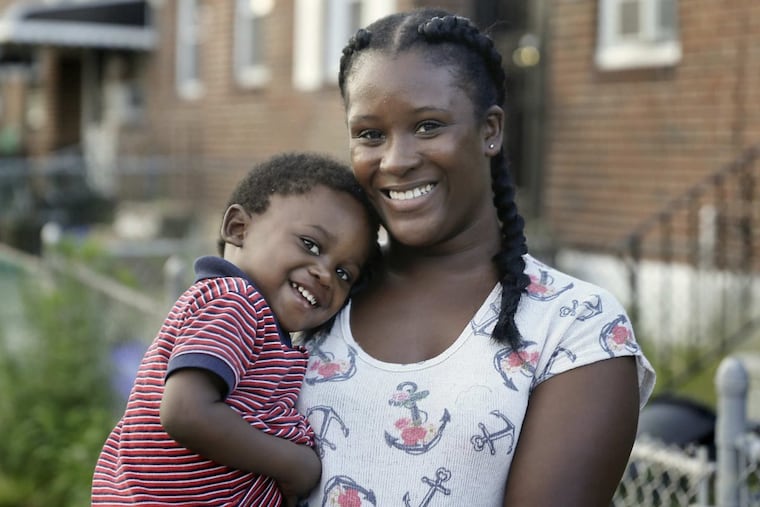Childhood hunger in North Philadelphia more than triples
Even among families with working parents, kids don't always have enough to eat

Stephanie Sakho believes that people who work should have fuller refrigerators than she does.
The divorced, certified nursing assistant from Southwest Philadelphia puts in 40 hours a week. But even with her salary and a $300 monthly allotment of food stamps, there isn't always enough to feed her 10-year-old daughter and year-old son.
"I think people would be surprised that there are kids in the city not getting enough to eat," said Sakho, 28, who makes $13 an hour, near the poverty line for a family of three. "I'm working, but people who see me don't know the refrigerator is empty."
Sakho's "deeply alarming" plight is becoming more common, said Mariana Chilton, director of the Center for Hunger-Free Communities and a professor of health management and policy at School of Public Health at Drexel University.
Between 2006 and 2016, childhood hunger in North Philadelphia has more than tripled among families where parents work 20 or more hours a week, according to Chilton's research at St. Christopher's Hospital for Children, part of Children's HealthWatch, a national research network that investigates the impact of public assistance programs on children's health. Chilton said her findings in North Philadelphia likely resemble rates of childhood hunger throughout the city.
"The trend looks terrible for working families," Chilton said. "You can't be working class in Philadelphia and thrive.
"This should surprise us — and stop us in our tracks."
Hunger is measured by assessing a family's food security or insecurity: Did everyone have access to enough food in a year for an active, healthy life?
According to Chilton's research, the food insecurity rate of children in North Philadelphia rose from 3.1 percent in 2006 — before the start of the recession — to 9.7 percent in 2016. The recession officially ended in mid-2009.
In comparison, the U.S. food insecurity rate for children was 8.8 percent in 2016.
Chilton's researchers have been collecting data since 2005, surveying more than 10,000 families with children younger than 4 who go to the emergency room at St. Christopher's. Researchers asked parents about hardships they face, including whether they ran out of food before they had enough money to buy more.
Earlier this month, the U.S. Department of Agriculture reported that one in six U.S. children live in households that struggle with hunger.
In North Philadelphia, Chilton's work shows, the number is closer to one in four.
"Sometimes, I don't eat," Sakho said, expressing a mother's simple solution for family hunger in Philadelphia. "Honestly, it feels horrible. I feel I can't provide for my kids, and I'm personally going hungry trying for them."
Sakho, who is attending West Chester University and is two years short of a degree in public health, said her children don't skip meals because she'll borrow money to feed them. But, she added in a quiet voice, "There's not as much for them as I want to have." Too often, she said, the children have cold cereal without milk for breakfast. Dinner can just be soup.
"It's not enough," said Sakho, a member of Chilton's Building Wealth and Health Network, which is designed to develop entrepreneurship and self-sufficiency among low-income families. "But it's something."
Sakho's troubles are shared by so many others. Here, 26 percent of residents live in poverty, making Philadelphia the poorest of the 10 most populous U.S. cities, federal figures show.
Among other obstacles, people here must deal with high rents, which cut into family food budgets. Sakho pays $900 a month for a 700-square foot, two-bedroom brick house.
Median rent in the city increased nearly 22 percent between 2008 and 2014, while incomes for people who rent went up only 11 percent in the same period, according to Ira Goldstein, president of policy solutions for Reinvestment Fund, a Philadelphia organization that works to build wealth in poor areas.
"Housing costs are not supposed to exceed 30 percent of household income, but in extreme cases, we see it at 80 percent," Goldstein said. "Rents have risen much more quickly than incomes.
"In Philadelphia, you'll find wages are flat or falling."
In fact, Drexel University economist Neeta Fogg determined, between 2008 and 2015, median annual earnings in Philadelphia fell 8.9 percent, from $34,309 to $31,239. And for home health care workers like Sakho, weekly wages dropped by 17 percent between 2008 and 2016, Fogg said.
Along with health care, many working Philadelphians at or just above the poverty line work in hotel and food-service jobs, which pay a median income of just under $18,000 annually, said Dermot Delude-Dix, research analyst with Unite Here Local 274 of the hospitality workers union.
Many people must work irregular hours, often without set scheduling, which plays havoc with workers who must line up child care.
It all can create hunger problems for parents who are doing their best but can't keep up with the basic costs of living here, Chilton said, adding that food stamp benefits meant to last a month often run out in two to three weeks in a city of high food prices. Overall, the cost of food in the area has gone up 25 percent between 2005 and 2017, she said.
If a family is suffering from hunger, children are more likely to be hospitalized and to have developmental delay, said Chilton.
She called for Philadelphia employers to raise wages to curtail childhood hunger. Rising food insecurity among children here "is an indictment against the major employers of Philadelphia," Chilton charged.
"The standard refrain is that if a person works, he or she won't be poor, won't be hungry," Chilton concluded. "That couldn't be further from the truth in Philadelphia."